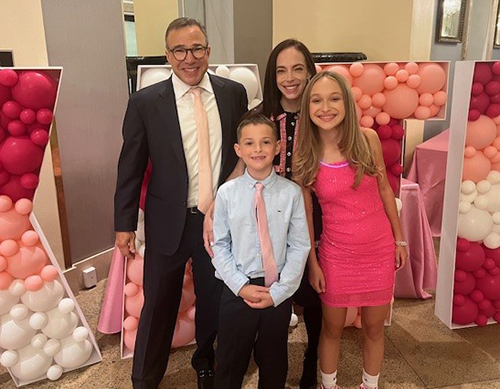Gratitude Stories - Andrew
A patient’s journey from helplessness to healing

For nearly two years, Andrew Rosenberg experienced physical discomfort that was difficult to describe and even harder to diagnose. “I had an increasing sense of tingling and numbness in my left hand and fingers, and over time, my left arm began to feel very heavy when I would raise it,” he recounts. “I would also occasionally lose my balance and feel less steady on my feet. But no one could pinpoint what was wrong with me.”
The 56-year-old from Washington, D.C., underwent physical therapy and treatment for what his doctors thought might be a pinched nerve or carpal tunnel syndrome. Andrew was even tested for Parkinson’s disease. Still, his conditions persisted.
An unsettling discovery
Last year, Andrew had his spine checked out at a well-regarded hospital in Washington, D.C. There, he was tested and diagnosed with Chiari Malformation, a condition, usually present from birth, which occurs when part of the skull is abnormally small or misshapen, putting pressure on the cerebellum, brain stem, and spinal cord.
Throughout his life, that pressure had increased and was starting to block the flow of critical fluid, which cushions and surrounds the brain and spinal cord. Without surgery, Andrew’s condition would lead to a gradual paralysis of his arms and legs.
But this wasn’t all he faced.
In addition to the Chiari Malformation, Andrew also had basilar invagination; a rare condition that occurs when the top of one’s spine presses into the base of the skull. In severe cases, like Andrew’s, the top of the spine compresses the brain stem and can cause neurological problems with a potentially fatal outcome.
Seeking alternative options, finding life-changing care
Neurologists at Andrew’s Washington, D.C. hospital recommended that he undergo a brain decompression in addition to a total spinal fusion surgery to stabilize his spine permanently by fusing his skull and neck down to the C7 vertebra in his back; a procedure that would leave Andy essentially unable to move his head.
A dad to two young kids, Andrew was hesitant to accept that option because of how it might negatively impact his quality of life. So, he continued to seek alternative options and found his way to Johns Hopkins. There, he consulted with a world-renowned expert on spinal column biomechanics and surgical outcomes.
“The specialist at Johns Hopkins told me, that in his opinion, there were only two surgeons in the country with the expertise and creativity to do my surgery and potentially preserve my mobility,” Andrew remembers. “One was a former colleague of his who was practicing at Rhode Island Hospital, and he recommended that I see him as soon as possible.”
That colleague was Ziya Gokaslan, MD, Chief of Neurosurgery at Rhode Island Hospital, who was hyper-responsive to Andrew’s urgent situation; reviewing his images the day he received them and scheduling surgery with a week.
During the delicate, eight-hour surgery, Dr. Gokaslan removed a small section of bone in the back of Andrew’s skull, opening the covering of his brain, and sewed a patch in place to provide more room and help relieve the pressure. He also performed a fusion from the base of Andrew’s skull down to his C4 vertebra to align and stabilize his cervical spine and correct instability, using screws, plates, and rods to bolster the compromised area. (Andrew’s C6 and C7 levels had been fused together from birth.)
“We limited the extent of Andrew’s fusion to preserve mobility,” Dr. Gokaslan explains, “and addressed his life-threatening condition. His outlook is excellent and he’s very likely to make a full recovery.”
Paying it forward
The founder and CEO of a success digital health tech company and a government relations firm, Andrew was so moved by his care experience that he pledged $100,000 to Rhode Island Hospital to support Dr. Gokaslan’s life-saving work; his father contributed $25,000, too.
Reflecting on his experience, Andrew now says, “It was really frightening to go through this journey, and the recovery has been no joke. But I was blessed to find the support I needed through the humanity and care of the people at Rhode Island Hospital, from top to bottom. I never felt like I was just a number, there was always someone looking out for me with compassion—and Dr. Gokaslan’s unique medical genius and the health outcomes he achieved for me were extraordinary. He truly saved my life and preserved my quality of life in a way I didn’t think possible.”
